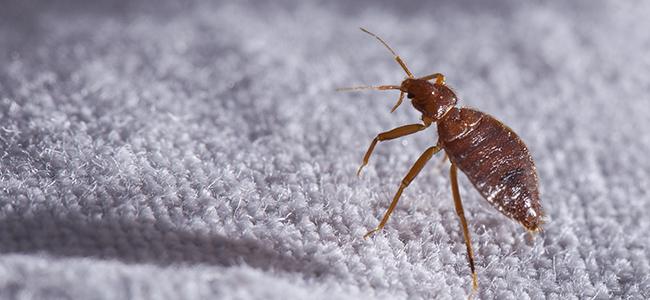
Fact vs. Myths: Bed Bugs In Washington D.C.
01/20/2022
Bed bugs are small parasitic pests that often resemble an apple seed to the naked eye. They have a wingless, oval-shaped body with a reddish-brown ...
READ MORE >
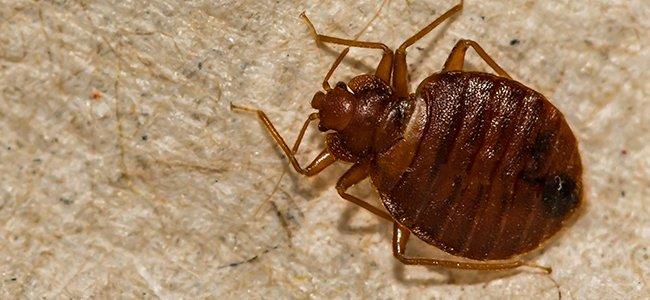
The factors that make bed bugs hard to get rid of in Maryland are the same factors that make these blood-eating insects hard to get rid of in other cities across the country, and in all parts of the world. Bed bugs, which are known scientifically as Cimex lectularius, seem to have exactly what they need to live with humans—and live with humans they do. These insects have been living with us since the very beginning. If they were easy to kill, they would have been driven to extinction by now. Here are some reasons why they're so hard to get rid of.
Perhaps the most important way bed bugs avoid extermination is their ability to adapt to the chemicals in their environment. A bed bug passes through five instars before it reaches its adult stage. As it goes from one instar to the next, it sheds its cuticle (that is the skin of the bed bug) and it develops a new one. This new cuticle is more resistant than the last. If a bed bug is exposed to chemicals that are meant to kill it, this process of cuticle creation will protect it and essentially turn it into a super bug. This causes conventional pest control treatments to fall short. While chemicals can be used as part of a complete solution, they are rarely a solution on their own.
When bed bugs invade, some people turn to chemicals to get control of them and unknowingly make the bugs in their home or business more resistant to chemicals. This can make the task of getting rid of them more difficult for a pest control company that relies heavily on conventional treatments. That is why the entomologists here at American Pest have guided our treatment strategies toward the use of heat remediation. Heat kills all bed bugs, even bugs that have become resistant to chemicals.
Since we've touched on heat as a solution for eliminating bed bugs, it is important that we discuss several ways heat and other natural treatments can fall short when they are not properly administered to eliminate bed bugs. The reasons they fall short have to do with the behavior patterns of bed bugs. Keep in mind that these examples can also pertain to chemical treatments.
Bed bugs avoid danger. If they sense a threat, they will let each other know by emitting pheromones. If bed bugs can detect your treatments, you will not be successful at eliminating them. We can give many examples of how this works. Here are only a few:
If you place a heater down in a room that has bed bugs, they'll move to where the heat can't hurt them, or they'll find a cold spot within the room to shield themselves from the heat. Heat is only one of many treatments that will drive bed bugs from one location to another.
If you lay a product down, such as diatomaceous earth, bed bugs will begin to avoid the area. They may even go into diapause and wait till you're done covering your entire home in this powder. Diapause is a low-energy state that allows bed bugs to live a long time without feeding.
Bed bugs hide inside objects within your home. They'll also hide within your walls. Many products are topical. Whether it is a chemical spray or a concoction of vinegar and water, the spray won't permeate into the locations where bed bugs are hiding. When they emerge from hiding, they will notice these repellents and behave as described above. No matter what you use to eliminate them, you're going to have very little success.
Products like vinegar and water have the ability to kill bed bugs if you spray the bugs directly, but they do little or nothing to eliminate bugs when they are sprayed on surfaces. Apart from being a repellent, they become inert when they dry. Some products will not become inert when they dry but they will become inert over a short period of time. If you want to have any hope of eliminating bed bugs that emerge from hiding, you need to use a product that is residual. But bed bugs will avoid residual treatments as soon as they detect danger. One reason residual products don't get all the bugs is that all bed bugs do not come out of hiding at the same time. If a few come out and don't return, the other bugs can enter diapause and wait for conditions to change. Or they may be driven into another location within the structure.
At American Pest, we understand the behaviors of bed bugs. The treatment strategy we use does not allow bed bugs to run or hide from the treatments. The specialized mobile heating units we deploy cause heat to radiate into their hiding places and eliminate them all. If necessary, we also use residual product application to deal with any bed bugs that may emerge after treatment. These work together to ensure the best results possible.
Do you see the problem? Bed bugs are hard to treat because they are resilient insects with natural-defensive behaviors. But there is another important piece to the puzzle. You need to consider where your infestation came from. As you attempt to get rid of the bugs in your home or business, more bugs can be coming in to replace the bugs you've managed to eliminate.
Bed bugs don't live in your yard. They get in by hitchhiking, so pest control treatments around your home or business will not protect you from these bugs. You have to understand how they are picked up and brought in.
Some ways bed bugs are carried in:
A bed bug gets into a carryable item, such as a bag, box, article of clothing, etc., and it is carried to a new location. This is done passively by bed bugs. You can prevent this transference by keeping articles in a plastic bag and by not placing these articles next to the belongings of others, especially in dark locations.
A bed bug lays eggs in a carryable item and the eggs hatch in a new location. Inspect the gaps, creases, and pockets of your items for tiny white eggs. You may also throw items into a dryer for 30 minutes to eliminate these eggs.
A bed bug or its eggs are carried to a new location in an object that is not typically carried, such as a piece of furniture, computer, alarm clock, mattress, box spring, etc. These items will need to be treated by a professional to eliminate the bugs within.
At American Pest, we help home and business owners understand where or how bed bugs might be coming in. This helps to get a clear understanding of what is necessary to prevent future infestations from taking root. In sensitive situations, we are called on to provide ongoing bed bug inspections to prevent infestations quickly.
Many of the bugs that get into our Maryland homes and businesses are fairly obvious about it. They climb on our walls, buzz around in the air, cling to webs in the corners of our common areas, climb in our curtains, and more. These bugs let you know that they're still around when your treatments fail. Bed bugs don't. They can be difficult to detect.
Size. When a bed bug hatches, it is only about 1 mm long. While you can still see them, they're really small and easy to miss. When they reach their adult stage, they aren't all that much larger. An adult bed bug is about 4.5 mm long. You can probably fit two dozen bed bugs on your thumbnail.
Photosensitivity. Bed bugs do not like the light. While they can feed during the day time, they will only do it in rooms that are extremely dark. That means you'll need a flashlight to catch these bugs moving about.
Thigmotaxis. Bed bugs like tight spaces. You will rarely see these bugs out in the open. They prefer to be squeezed into tight spaces such as seams, cracks, creases, stitching, pockets, and in between your mattress and box spring.
Harborage. The first place you're going to check for a bed bug is in your bed. But bed bugs don't always live in beds. They can live in many locations within a home or business. They'll live in electronics, furniture, and other objects that have voids within. They'll live in walls and behind baseboards, crown molding, and other fixtures. Bed bugs establish themselves near beds, couches, and other places where humans sleep or sit. But they are not limited to living in these items.
At American Pest, we understand how difficult bed bugs are to detect. That is why our strategies include the use of K9 Inspectors. Dogs are used in many fields to detect things that are difficult or impossible for humans to detect. They're called on to sniff out traces of blood at crime scenes, illegal drugs and explosives at inspection points, feces left by wildlife in infested structures, and contraband electronics, such as computers, cell phones, and thumb drives. So it isn't surprising that they have been tasked to sniff out bed bugs in infested locations.
Dogs use their noses almost like x-ray vision. It is pretty incredible really. They can smell things that are completely hidden from view, which is where bed bugs are going to be. A trained dog can detect bed bugs in all stages of development. They do it with a surprising level of accuracy, and they can do it much quicker than a human inspector. While a licensed pest management professional can detect the presence of bed bugs, the use of K9 Inspectors is a powerful tool in our arsenal.
As you can see, bed bugs in Maryland are hard to get rid of. But the experts at American Pest have developed a strategy that works to get rid of bed bugs with a high level of success. When these blood-eating insects get into your Maryland home or business, you can trust our bed bug exterminators to eliminate all of them. We also provide ongoing bed bug protection to quickly prevent infestations before they can take root. This is an essential service for businesses that rely on providing a bug-free environment for guests or tenants.
If you have questions that were not addressed in this article, we'd love to hear from you. American Pest is a pest control leader with Board Certified Entomologists and industry-leading pest control experts on staff. We can help you get a comprehensive solution for your bed bug problem. But most importantly, we can rid your home or business of all the bugs that have infested. Reach out to us today with your questions or schedule a free estimate. We are standing by to assist you with all of your Maryland pest control needs.

01/20/2022
Bed bugs are small parasitic pests that often resemble an apple seed to the naked eye. They have a wingless, oval-shaped body with a reddish-brown ...
READ MORE >
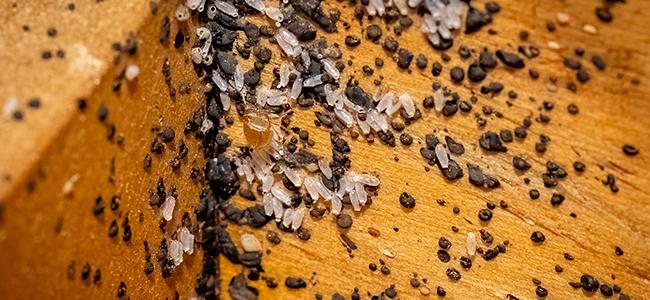
12/03/2021
Bed bugs can be difficult to identify, but this guide is here to help you tell them apart from other pests in Washington D.C. Read on to get the ma...
READ MORE >
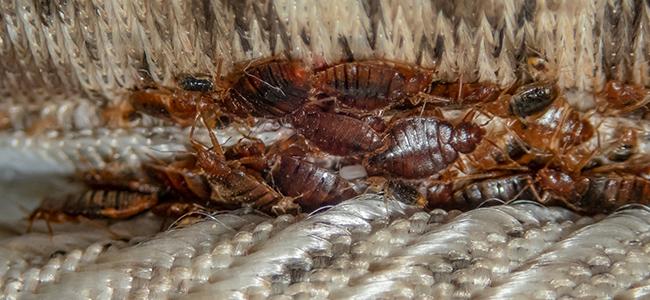
11/15/2021
Bed bugs may be small, but they can often cause major problems once they infest your Maryland home. Contact the professionals a...
READ MORE >
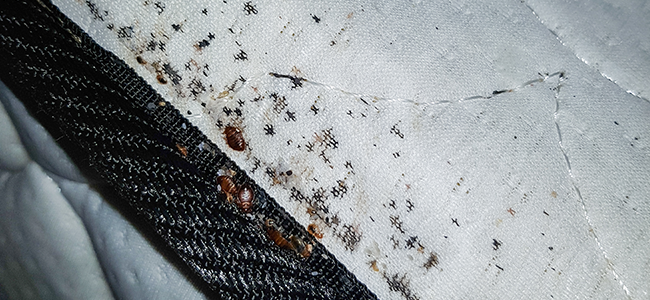
10/30/2021
Bed bugs can appear in almost any residential environment, from communal living to busy family homes. Contrary to popular belief, bed bugs do not c...
READ MORE >

Protect your home and family from nuisance and potentially damaging pests with a Preferred Care home pest control plan. Starting at $49/month

Don't let the bed bugs bite a second longer. Contact American Pest for the most comprehensive bed bug control in the industry. Learn More

Our certified rodent control pros will put an end to your frustration by getting rid of rats and mice inside your home. Learn More

Say goodbye to wood-destroying termites in your home when you contact American Pest for expert termite control. Learn More

Trust American Pest to deliver professional backyard tick control services that are guaranteed to get results. Learn More

Don't spend the warm-weather season indoors, find out how American Pest's professional treatments get rid of mosquitoes. Learn More
Fill out the form and recieve feedback in less than 5 minutes. For immediate service please call.